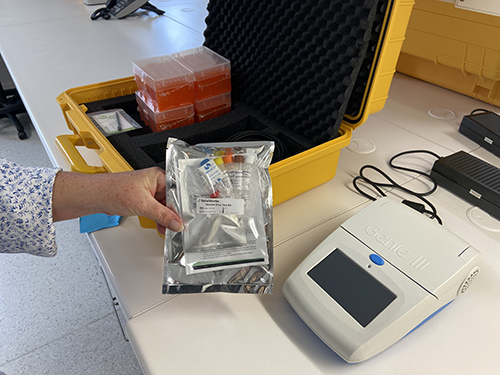No horsing around: super-fast Hendra test developed
University of Queensland vets are diagnosing the deadly Hendra virus in horses faster than ever, developing a diagnostic point-of-care kit that can detect the pathogen in under an hour, rather than days.
Veterinarian Professor Ben Ahern said a rapid point-of-care diagnostic test to detect Hendra infections in horses has been sorely needed for decades.
“Hendra virus kills humans and horses alike – the virus spreads to horses from flying foxes, with an infected horse occasionally passing the infection on to humans,” Professor Ahern said.
“Without vaccination, the virus has a case fatality rate of 57 per cent among humans and 79 per cent among horses – it’s incredibly deadly.
“Rather than sending samples off to a lab, which risks an outbreak in the meantime, our testing protocol takes routine samples from a possibly infected horse and inactivates any virus that may be present in those samples.
“Following a heat treatment step of samples to inactivate the virus, these non-infectious samples are then tested using a handy molecular diagnostics machine – known as a LAMP Genie III – which is about the size of a box of tissues and is battery powered and completely portable.
“This process gives us results in under one hour, which is incredibly fast when compared to the many days it may take from collection of samples, getting them tested at an external lab and obtaining results.
“Horses aren’t suffering in the interim and humans giving care to them can avoid becoming exposed.”
Development of the point-of-care Hendra virus LAMP test has now advanced to the manufacturing stage and commercial kits are currently being produced.
Pending final approval from the Queensland Chief Veterinary Officer, the Genie machine and associated Hendra virus LAMP kits will be available for veterinarians to purchase and use.
“Due to the cost and technical training required, these tests will likely be performed by veterinarians or large equestrian bodies with veterinarian assistance,” Professor Ahern said.
 “However, with the mobile capacity of this testing system, they can go directly to a farm to diagnose a suspected case, expanding treatment options for horses.”
“However, with the mobile capacity of this testing system, they can go directly to a farm to diagnose a suspected case, expanding treatment options for horses.”
Annelies McGaw, AgriFutures Australia Manager, Research – a key partner involved in funding the development of the kits – said the project was a big win for horse and human health.
“AgriFutures Thoroughbred Horses Program invests in research and development that improves the profitability and sustainability of the Australian thoroughbred industry, meaning the health of our farmers, stablehands, farriers and horses is critical,” Ms McGaw said.
“This research has resulted in timely and tangible solutions for the thousands of people working in horse-related industries across the country, and we’re thrilled to see these tests becoming a reality.
“We’re extremely proud of the research and development we get to work on, not just within the thoroughbred horse industry, but across the Australian agricultural landscape.”
Equestrian NSW CEO Bruce Farrar said that, as a significant funder of the project, they were delighted with the progress made by Professor Ahern and his team.
“We look forward to the roll out of the testing kits, to provide a safer and faster diagnosis of suspected Hendra viruses cases.”
This University of Queensland project has been supported by AgriFutures Thoroughbred Horses Program, Equestrian NSW, the Department of Agriculture and Fisheries Queensland’s Biosecurity Sciences Laboratory, GeneWorks, Equine Veterinarians Australia, the Australian Veterinary Association, and five private veterinary practises in Queensland and New South Wales.

